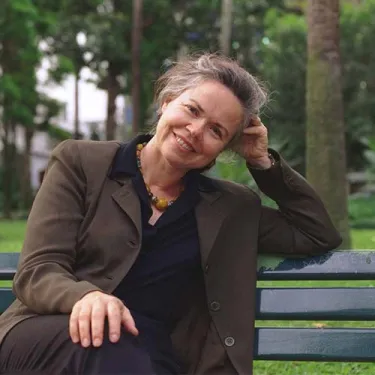Susan Stewart
Visiting Poet

Poet, critic, translator, and former MacArthur fellow, Susan Stewart is the author of six collections of poetry, including The Forest, which received the Literary Award of the Philadelphia Atheneum, Columbarium, which received the National Book Critics Circle Award, and, most recently, Red Rover. As dedicated to the senses as they are to the mind, Susan Stewart’s fiercely ambitious poems never for a minute forget to make music. As Allen Grossman writes, Stewart “has built a poetic syntax capable of conveying an utterly singular account of consciousness, by the light of which it is possible to see the structure of the human world with a new clarity and an unforeseen precision, possible only in her presence and by means of her art.”
Of Columbarium, Edward Hirsch wrote in The Washington Post, ”Each of the poems takes a radcially different form, and no two are alike. It’s as if the endless mutability and metamorphic power of nature find an echo in a series of malleable poetic forms.” Dan Chiasson reviewed the book in Poetry, praising the poems for being “gorgeous in themselves, but more gorgeous for the philosophical heft of the fabric they are embroidered on.”
Stewart recently translated Love Lessons: Selected Poems of Alda Merini and her books of criticism include The Open Studio: Essays in Art and Aesthetics, Poetry and the Fate of the Senses, which received both the 2002 Christian Gauss Award for Literary Criticism from Phi Beta Kappa and the 2004 Truman Capote Award in Literary Criticism.
Additional honors include a Lila Wallace Individual Writer’s Award, two grants in poetry from the National Endowment for the Arts, a Pew Fellowship for the Arts, and fellowships from the Guggenheim Foundation and the MacArthur Foundation. Stewart is currently Professor of English at Princeton University where she teaches the history of poetry and aesthetics. She was elected a Chancellor of the Academy of American Poets in 2005.
Select Poems
Let me tell you about my marvelous god, how he hides in the hexagons
of the bees, how the drought that wrings its leather hands
above the world is of his making, as well as the rain in the quiet minutes
that leave only thoughts of rain.
An atom is working and working, an atom is working in deepest
night, then bursting like the farthest star; it is far
smaller than a pinprick, far smaller than a zero and it has no
will, no will toward us.
This is why the heart has paced and paced,
will pace and pace across the field where yarrow
was and now is dust. A leaf catches
in a bone. e burrow’s shut by a tumbled clod
and the roots, upturned, are hot to the touch.
How my god is a feathered and whirling thing; you will singe your arm
when you pluck him from the air,
when you pluck him from that sky
where grieving swirls, and you will burn again
throwing him back.
From COLUMBARIUM (University of Chicago Press, 2003)
Barred back from the glare
gone gripped along
the rail run down
running from or
toward no matter
no mind never
hell for leather
scraped across
night’s increment
torn from the sedge
the salvage
shorn at
the edge forlorn
forewarned
hefting waxed
breached waning
whine needling
half heard
then hearing
help wound in
the wind
From RED ROVER (University of Chicago Press, 2003)
Ghostly chalk rounded low in bluest
sky, seeing, while the gulls circle
inland—lost, you think, though they know,
they must, where they’re going. The women
now pinning up their washing, a tin
basin, a caboose or a tugboat, forms
of future in the distance. Found,
you think, though you couldn’t say exactly
where they are. There was a place where you
were walking, though now, and now, it’s fading
—it’s fading, will be gone by the time
you arrive. Love there persisting
when love has almost died, when the dark it knew
has died, and still it waits, the white conscience.
From RED ROVER (University of Chicago Press, 2008)